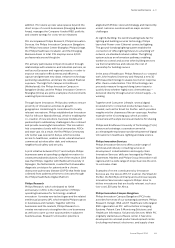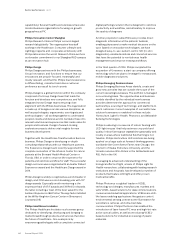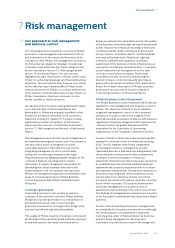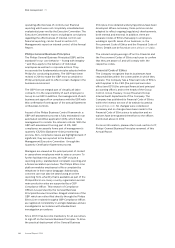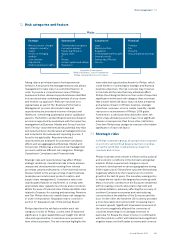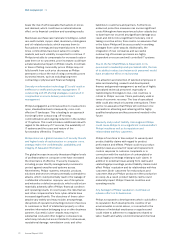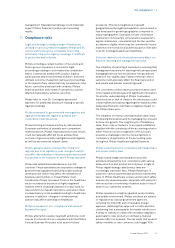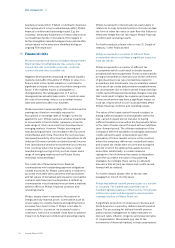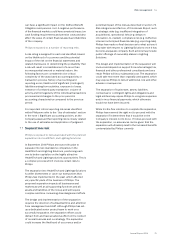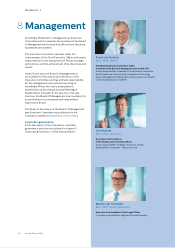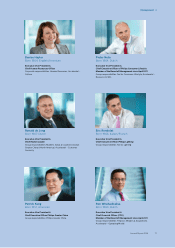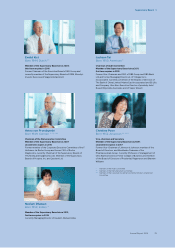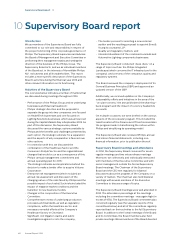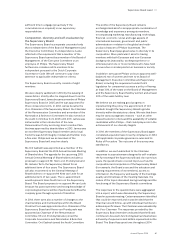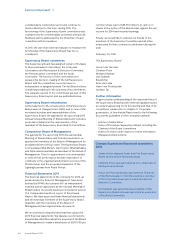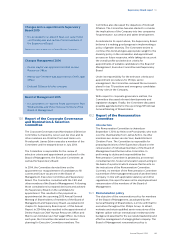Philips 2014 Annual Report Download - page 73
Download and view the complete annual report
Please find page 73 of the 2014 Philips annual report below. You can navigate through the pages in the report by either clicking on the pages listed below, or by using the keyword search tool below to find specific information within the annual report.Risk management 7.4
Annual Report 2014 73
management. Reputational damage could materially
impact Philips’ nancial condition and operating
results.
7.5 Compliance risks
Legal proceedings covering a range of matters are
pending in various jurisdictions against Philips and its
current and former group companies. Due to the
uncertainty inherent in legal proceedings, it is dicult
to predict the nal outcome.
Philips, including a certain number of its current and
former group companies, is involved in legal
proceedings relating to such matters as competition
issues, commercial transactions, product liability,
participations and environmental pollution. Since the
ultimate outcome of asserted claims and proceedings,
or the impact of any claims that may be asserted in the
future, cannot be predicted with certainty, Philips’
nancial position and results of operations could be
aected materially by adverse outcomes.
Please refer to note 26, Contingent assets and
liabilities, for additional disclosure relating to specic
legal proceedings.
Philips is exposed to governmental investigations and
legal proceedings with regard to possible anti-
competitive market practices.
Philips is facing increased scrutiny by national and
European authorities of possible anti-competitive
market practices. Philips’ nancial position and results
could be materially aected by an adverse nal
outcome of governmental investigations and litigation,
as well as any potential related claims.
Philips’ global presence exposes the company to
regional and local regulatory rules, changes to which
may aect the realization of business opportunities and
investments in the countries in which Philips operates.
Philips has established subsidiaries in over 80
countries. These subsidiaries are exposed to changes in
governmental regulations and unfavorable political
developments, which may aect the realization of
business opportunities or impair Philips’ local
investments. Philips’ increased focus on the healthcare
sector increases its exposure to highly regulated
markets, where obtaining clearances or approvals for
new products is of great importance, and where there
is a dependency on the available funding for healthcare
systems. In addition, changes in reimbursement
policies may aect spending on healthcare.
Philips is exposed to non-compliance with General
Business Principles.
Philips’ attempts to realize its growth ambitions could
expose it to the risk of non-compliance with the Philips
General Business Principles, such as anti-bribery
provisions. This risk is heightened in growth
geographies as the legal and regulatory environment is
less developed in growth geographies compared to
mature geographies. Examples include commission
payments to third parties, remuneration payments to
agents, distributors, consultants and the like, and the
acceptance of gifts, which may be considered in some
markets to be normal local business practice. (See also
note 26, Contingent assets and liabilities.)
Defective internal controls would adversely aect our
nancial reporting and management process.
The reliability of reporting is important in ensuring that
management decisions for steering the businesses and
managing both top-line and bottom-line growth are
based on top-quality data. Flaws in internal control
systems could adversely aect the nancial position
and results and hamper expected growth.
The correctness of disclosures provides investors and
other market professionals with signicant information
for a better understanding of Philips’ businesses.
Imperfections or lack of clarity in the disclosures could
create market uncertainty regarding the reliability of the
data presented and could have a negative impact on
the Philips share price.
The reliability of revenue and expenditure data is key
for steering the business and for managing top-line and
bottom-line growth. The long lifecycle of healthcare
sales, from order acceptance to accepted installation,
together with the complexity of the accounting rules for
when revenue can be recognized in the accounts,
presents a challenge in terms of ensuring there is
consistency of application of the accounting rules
throughout Philips Healthcare’s global business.
Philips is exposed to non-compliance with data privacy
and product safety laws.
Philips’ brand image and reputation would be
adversely impacted by non-compliance with various
data protection and product security laws. In light of
Philips digital strategy, data privacy laws are
increasingly important. Also, Philips Healthcare is
subject to various (patient) data protection and safety
laws. In Philips Healthcare, privacy and product safety
and security issues may arise, especially with respect to
remote access or monitoring of patient data or loss of
data on our customers’ systems.
Philips operates in a highly regulated product safety
and quality environment. Philips’ products are subject
to regulation by various government agencies,
including the FDA (US) and comparable foreign
agencies. Obtaining their approval is costly and time
consuming, but a prerequisite for market introduction.
A delay or inability to obtain the necessary regulatory
approvals for new products could have a material
adverse eect on business. The risk exists that product
safety incidents or user concerns could trigger FDA


